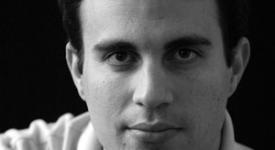Professor Drives Research of Humanoid Robots
09/29/2011 - The Daily Texan features computer science professor Peter Stone.
09/29/2011 - The Daily Texan features computer science professor Peter Stone.
09/21/2011 - Computer science professor Peter Stone has been named a 2011 Yahoo! Faculty Research and Engagement Program (FREP) recipient and has been granted a $10,000 gift for his proposal titled “Testing a Liquidity Sensitive Market Maker for a Prediction Market on the UT Austin CS Building Opening.”
09/12/2011 - UTCS is pleased to announce Best Paper Awards won by our faculty, staff and students.
08/10/2011 - For his work on the foundations of a new way of encrypting data, Brent Waters from the University of Texas in Austin has been elected as one of this year's...

08/05/2011 - Microsoft Research has selected Assistant Professor Brent Waters as one of eight Microsoft Research Faculty Fellows of 2011.
07/28/2011 - RoboCup Remix from Texas Science on Vimeo. The video footage is from the second half of the championship game in the 3-D Simulation league in RoboCupSoccer 2011. UT Austin Villa won the game, 4-0, over a team from Changzhou Institute of Technology in China. The audio track is “humm ok,” by Gablé (Creative Commons).
07/19/2011 - AUSTIN, Texas—UT Austin Villa, a team of programmers led by University of Texas at Austin computer scientists Peter Stone and Patrick MacAlpine, has won the 2011 RoboCup Soccer championships in the 3-D simulation division. The UT Austin Villa team beat 21 other teams from 11 nations for the trophy. In the process they scored 136 goals and conceded none. The annual tournament, which was founded in 1997 to foster innovation in artificial intelligence and robotics research, was held last week in Istanbul, Turkey.
05/16/2011 - Researchers at Yale and the University of Texas used a neural network -- a computer brain -- to test out medical theories of what causes schizophrenia. The result was a computer brain that can't tell the difference between stories about itself and fanciful stories about gangsters, and claims responsibility for terrorist acts.
05/09/2011 - Computer simulations of malfunctioning brains may be the key to understanding schizophrenia and other conditions. A research team including computer scientists at the University of Texas at Austin and a professor of psychiatry at Yale have been testing various theories of how schizophrenic brains misfire as they process information. People with schizophrenia often have trouble repeating different stories, for instance, frequently combining elements of separate stories and inserting themselves into the narrative.
05/06/2011 - In a bid to help understand the way that the human brain malfunctions to cause mental illness scientists have caused a computer system to lose its mind and claim responsibilty for a terrorist bombing. The team at the University of Texas and Yale University, including Professor Risto Miikkulainen and grad student Uli Grasemann, were looking to how the human brain is affected with schizophrenia by simulating a hypothesis that excessive dopamine in the brain can cause “exaggerated salience”, whereby the brain is learning from things it shouldn’t.